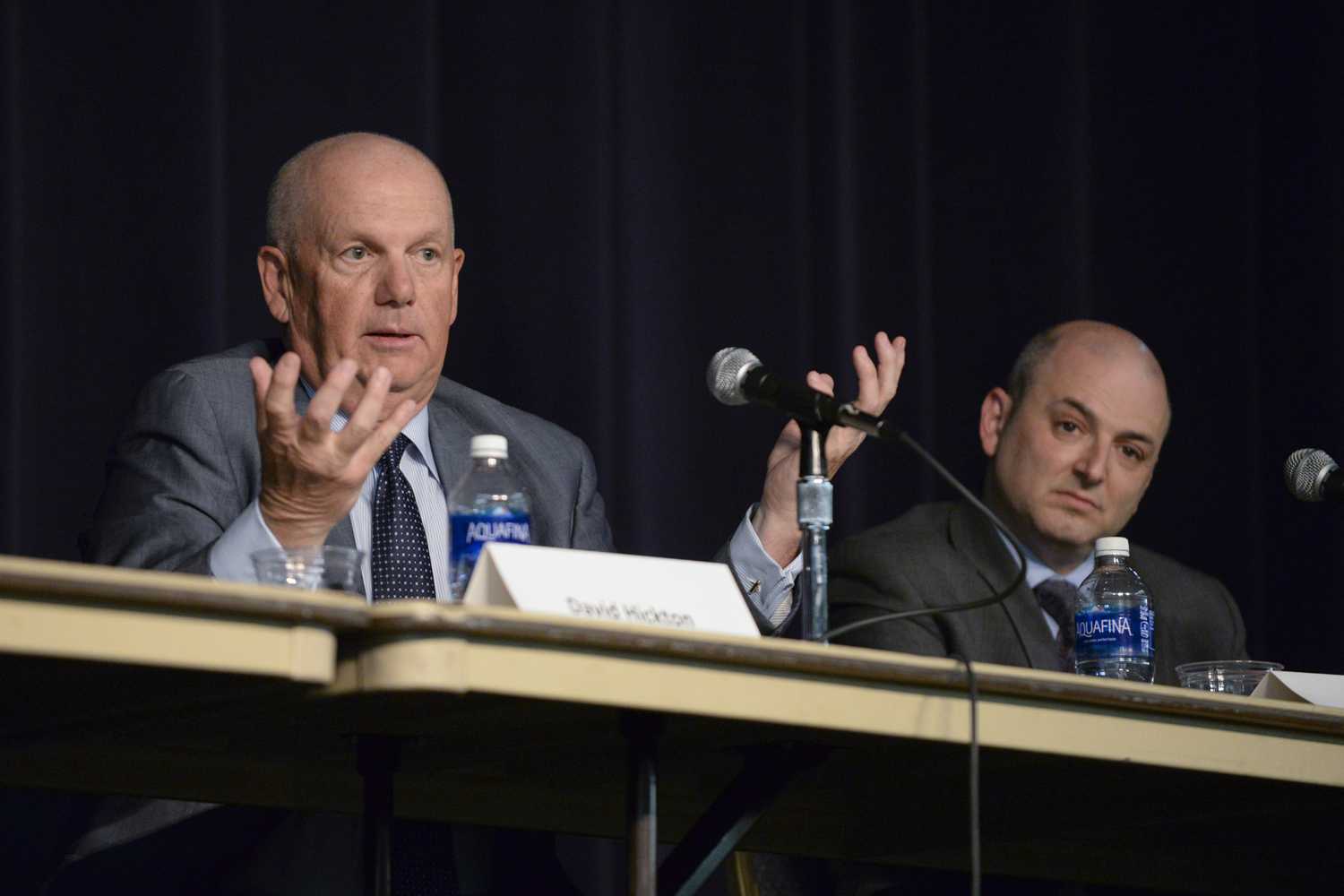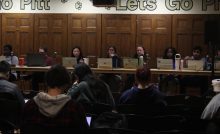Panelists consider social media’s impact


David J. Hickton (left), founding director of Pitt’s Institute for Cyber Law, Policy, and Security, and Brian Primack (right), the dean of the Honors College, discuss the cultural shift around the world caused by social media. (Photo by Issi Glatts | Assistant Visual Editor)
When David Hickton addressed the concept of social media Wednesday night, he said users are reaching a tipping point of outrage with it that will lead to social change.
“We’re recognizing that we’re being deceived and diluted by this nonsense,” the former U.S. Attorney said.
The University Honors College hosted “Social Media and the Crisis in Social Discourse” Monday at 7:30 p.m. in the Alumni Hall auditorium. The panelists — Walter Mossberg, David Hickton, Indira Lakshmanan and Brian Primack — discussed social media and its impact on society to a crowd of more than 100 people.
The conversation focused on issues ranging from the cultural shifts caused by social media and its contributions to many multifaceted issues, including deteriorating mental health, debates between prioritization of security or privacy and increasing distrust of journalism. Mossberg, a former technology columnist for The Wall Street Journal, said executives that run social networks don’t believe in privacy or security for users.
Though the panel did not focus on the recent Cambridge Analytica scandal, panelists mentioned the data firm’s harvesting of 50 million Americans’ Facebook data in the run-up to the 2016 election. The incident has spurred renewed concern over the ways social media companies protect user data. Mossberg argued for more regulation to safeguard consumers.
“We need a policy in privacy, we need a policy in security and we need regulation,” Mossberg said. “We’re obviously not going to get it with this Congress and this president.”
Conversely, Hickton saw privacy and security as mutually exclusive. Hickton, the founding director of Pitt Institute for Cyber Law, Policy, and Security, prosecuted cases on national security and cybercrime as a U.S. Attorney. He said that after the 9/11 terrorist attacks, many people wanted the U.S. government to provide the public with more security to prevent future attacks. Hickton, however, noted that increased security comes decreased privacy — prompting public distrust of the government and privacy regulations.
“In order to assure you of [increased security], we had to intrude upon some of your privacy in order to gather enough data to do our work,” Hickton said.
Social media has not only magnified distrust in the government — according to Lakshmanan, it’s also provoked an increased public distrust in journalism. Lakshmanan, the chair of journalism ethics at the Poynter Institute, said this distrust was intensified during the 2016 presidential election and amplified by President Donald Trump’s efforts to label the media as “fake news.”
“Social media is just another platform for doing journalism. And in the same way that newspapers, television, radio [and] digital online media are all platforms for doing journalism — some of it is great, some of it is terrible,” Lakshmanan said. “Social media is the same thing.”
But while social media can be used as a positive tool for increasing access to news, Primack, dean of the University Honors College, argued it can contribute to poor mental health. He said increased usage of social media may contribute to increased rates of depression and anxiety.
Primack co-authored a 2009 study that supported this connection. It claimed social media can make users feel socially isolated, particularly in the case of young adults. If this is the case, Primack said the term “social media” should be reevaluated.
“We have to take a look at that term ‘social media,’ and we have to say if the definition of ‘social’ is about relationship,” Primack said. “If it’s about feeling connected to other people, maybe it’s not the right term.”
Lakshmanan attributed adolescent’s experiences to FOMO. According to a 2016 article published in Computers in Human Behavior, FOMO drives overuse of social media. Lakshmanan said when adolescents compare their own lives to others through social media, they can experience increased feelings of social isolation.
“When [adolescents] engage very deeply in social media, they’re watching that everybody else is having a better life than they’re having,” Lakshmanan said.
Although adolescents are especially affected by the negative effects of social media use, Hickton said he believes younger generations will provide a solution to regulations on privacy and security in social media.
“I am convinced that the young people, the millennial generation, is going to save us,” Hickton said. “I’m optimistic we’re going to figure this all out.”
Recent Posts
SGB addresses concerns about ICE presence on campus, hears SJP lawsuit against administration, approves governing code bill
At its weekly meeting on Tuesday at Nordy’s Place, Student Government Board heard concerns about…
ACLU of Pennsylvania sues Pitt over SJP suspension
The ACLU of Pennsylvania filed a federal civil lawsuit against the University of Pittsburgh and…
Marquan Pope: The ultimate shark
One of the most remarkable things about sharks is that an injury doesn’t deter them.…
Who Asked? // Do we really get a summer vacation?
This installment of Who Asked? by staff writer Brynn Murawski mourns the seemingly impossible perfect…
Notes From an Average Girl // Notes from my junior year
In this edition of Notes From an Average Girl, senior staff writer Madeline Milchman reflects…
Meaning at the Movies // The Power of the Movie Theater
In this edition of “Meaning at the Movies,” staff writer Lauren Deaton discusses her love…

